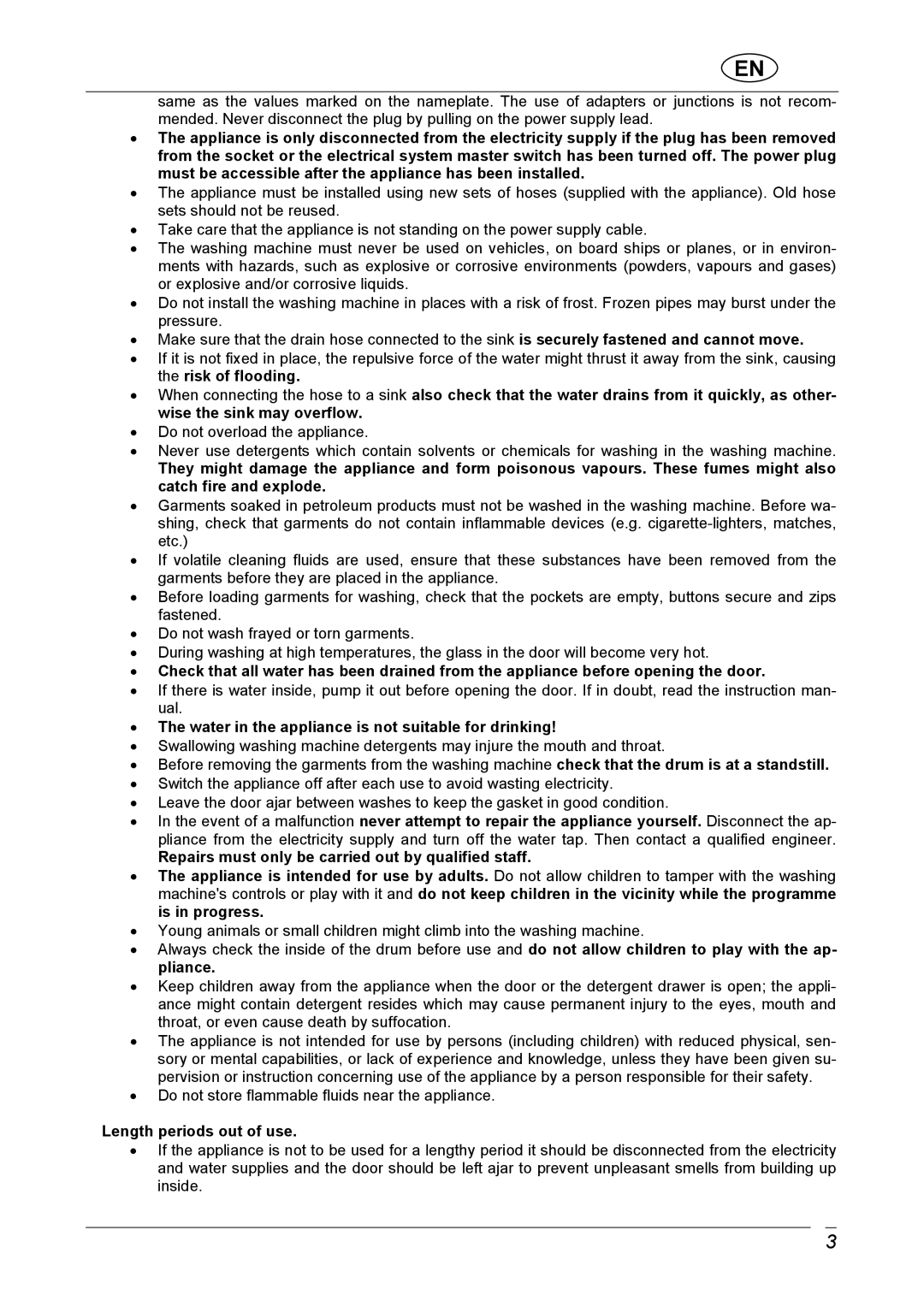
EN
same as the values marked on the nameplate. The use of adapters or junctions is not recom- mended. Never disconnect the plug by pulling on the power supply lead.
•The appliance is only disconnected from the electricity supply if the plug has been removed from the socket or the electrical system master switch has been turned off. The power plug must be accessible after the appliance has been installed.
•The appliance must be installed using new sets of hoses (supplied with the appliance). Old hose sets should not be reused.
•Take care that the appliance is not standing on the power supply cable.
•The washing machine must never be used on vehicles, on board ships or planes, or in environ- ments with hazards, such as explosive or corrosive environments (powders, vapours and gases) or explosive and/or corrosive liquids.
•Do not install the washing machine in places with a risk of frost. Frozen pipes may burst under the pressure.
•Make sure that the drain hose connected to the sink is securely fastened and cannot move.
•If it is not fixed in place, the repulsive force of the water might thrust it away from the sink, causing the risk of flooding.
•When connecting the hose to a sink also check that the water drains from it quickly, as other- wise the sink may overflow.
•Do not overload the appliance.
•Never use detergents which contain solvents or chemicals for washing in the washing machine. They might damage the appliance and form poisonous vapours. These fumes might also catch fire and explode.
•Garments soaked in petroleum products must not be washed in the washing machine. Before wa- shing, check that garments do not contain inflammable devices (e.g.
•If volatile cleaning fluids are used, ensure that these substances have been removed from the garments before they are placed in the appliance.
•Before loading garments for washing, check that the pockets are empty, buttons secure and zips fastened.
•Do not wash frayed or torn garments.
•During washing at high temperatures, the glass in the door will become very hot.
•Check that all water has been drained from the appliance before opening the door.
•If there is water inside, pump it out before opening the door. If in doubt, read the instruction man- ual.
•The water in the appliance is not suitable for drinking!
•Swallowing washing machine detergents may injure the mouth and throat.
•Before removing the garments from the washing machine check that the drum is at a standstill.
•Switch the appliance off after each use to avoid wasting electricity.
•Leave the door ajar between washes to keep the gasket in good condition.
•In the event of a malfunction never attempt to repair the appliance yourself. Disconnect the ap- pliance from the electricity supply and turn off the water tap. Then contact a qualified engineer. Repairs must only be carried out by qualified staff.
•The appliance is intended for use by adults. Do not allow children to tamper with the washing machine's controls or play with it and do not keep children in the vicinity while the programme is in progress.
•Young animals or small children might climb into the washing machine.
•Always check the inside of the drum before use and do not allow children to play with the ap- pliance.
•Keep children away from the appliance when the door or the detergent drawer is open; the appli- ance might contain detergent resides which may cause permanent injury to the eyes, mouth and throat, or even cause death by suffocation.
•The appliance is not intended for use by persons (including children) with reduced physical, sen- sory or mental capabilities, or lack of experience and knowledge, unless they have been given su- pervision or instruction concerning use of the appliance by a person responsible for their safety.
•Do not store flammable fluids near the appliance.
Length periods out of use.
•If the appliance is not to be used for a lengthy period it should be disconnected from the electricity and water supplies and the door should be left ajar to prevent unpleasant smells from building up inside.
3
